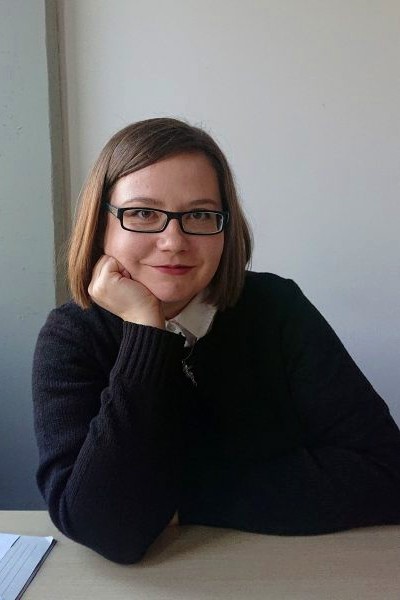Justyna Jajszczok
justyna.jajszczok@us.edu.pl
https://orcid.org/0000-0003-4034-4054
https://silesian.academia.edu/JustynaJajszczok
https://www.researchgate.net/profile/Justyna-Jajszczok
https://scholar.google.com/citations?user=14KvBEYAAAAJ&hl=en&authuser=2
Stopień naukowy doktora nauk humanistycznych w zakresie literaturoznawstwa na Wydziale Filologicznym Uniwersytetu Śląskiego w Katowicach uzyskałam w 2017 roku na podstawie rozprawy The Parasite and Parasitism in Victorian Science and Literature. Moim głównym obszarem zainteresowań badawczych jest brytyjska literatura inwazji przed rokiem 1914 i narracje infekcji, a także historia parazytologii i medycyny (zwłaszcza tropikalnej) oraz złoty wiek powieści detektywistycznej.
Monografie redagowane
Justyna Jajszczok, Aleksandra Musiał, red. 2019. The Body in History, Culture, and the Arts. London, New York: Routledge.
Czasopisma redagowane
- Alicja Bemben, Justyna Jajszczok, red. 2021. Świat i Słowo / World and Word 36 (1).
- Justyna Jajszczok, Aleksandra Musiał, red. Świat i Słowo / World and Word 32(1): 61–71.
Rozdziały w monografiach
- 2021. “Disgust and Parasites in Nineteenth-Century Science and Fiction” w: Emotions as Engines of History, red. Rafał Borysławski i Alicja Bemben. London, New York: Routledge, 168–186.
- 2019. “The Voiceless and the Vocal: Infection Literature and The Sign of the Four” w: Voices of illness : negotiating meaning and identity. Ed. Peter Bray. Leiden, Boston: Brill, 293–311.
- 2018. “Filthy Egyptian Tricks” in Arthur Conan Doyle’s “The Ring of Thoth” and “Lot no. 249” w: From Queen Anne to Queen Victoria : readings in 18th and 19th century British literature and culture. Vol. 6, red. Grażyna Bystydzieńska, Emma Harris. Warszawa: Wydawnictwa Uniwersytetu Warszawskiego, 105–113.
- 2017. “Inspector Bucket: A Dickensian Detective.” In: Krawczyk-Żywko, L. (eds) Victorian Detectives in Contemporary Culture. Palgrave Pivot, Cham. https://doi.org/10.1007/978-3-319-69311-8_2
Artykuły w czasopismach
- 2021. “The Last Day and Brexit: Delusions of Future Past”. Porównania / Comparisons 30 (3): 167–77. https://doi.org/10.14746/por.2021.3.11.
- 2021. “Why trust academia?: A reflection on the credibility of specialists”. !”. Świat i Słowo / World and Word 36 (1): 15–28. https://doi.org/10.5604/01.3001.0014.7957
- 2020. “The future-war fiction and the problem of two camps in ‘The Battle of Dorking’ and P.G. Wodehouse’s The Swoop!”. Świat i Słowo / World and Word 34 (1): 147–157. http://doi.org/10.5604/01.3001.0014.3065
- 2019. “Infectious bodies, peculiar territories :visions of invasion in 19th-century literature and science”. Świat i Słowo / World and Word 32(1): 61–71. http://dx.doi.org/10.5281/zenodo.2617079
Justyna Jajszczok
justyna.jajszczok@us.edu.pl
https://orcid.org/0000-0003-4034-4054
https://silesian.academia.edu/JustynaJajszczok
https://www.researchgate.net/profile/Justyna-Jajszczok
https://scholar.google.com/citations?user=14KvBEYAAAAJ&hl=en&authuser=2
I obtained my Ph.D. in humanities in the field of literary studies at the Faculty of Philology of the University of Silesia in Katowice in 2017 on the basis of the dissertation The Parasite and Parasitism in Victorian Science and Literature. My main area of interest is pre-1914 British invasion literature and infection narratives, as well as the history of parasitology and medicine (especially tropical), and the golden age of detective novel.
Edited monographs:
Justyna Jajszczok, Aleksandra Musiał, ed. 2019. The Body in History, Culture, and the Arts. London, New York: Routledge.
Edited journals:
- Alicja Bemben, Justyna Jajszczok, eds. 2021. Świat i Słowo / World and Word 36 (1).
- Justyna Jajszczok, Aleksandra Musiał, eds. Świat i Słowo / World and Word 32(1): 61–71.
Chapters in monographs:
- 2021. “Disgust and Parasites in Nineteenth-Century Science and Fiction” in: Emotions as Engines of History, ed. Rafał Borysławski i Alicja Bemben. London, New York: Routledge, 168–186.
- 2019. “The Voiceless and the Vocal: Infection Literature and The Sign of the Four” in: Voices of illness : negotiating meaning and identity. Ed. Peter Bray. Leiden, Boston: Brill, 293–311.
- 2018. “Filthy Egyptian Tricks” in Arthur Conan Doyle’s “The Ring of Thoth” and “Lot no. 249” in: From Queen Anne to Queen Victoria : readings in 18th and 19th century British literature and culture. Vol. 6, ed. Grażyna Bystydzieńska, Emma Harris. Warszawa: Wydawnictwa Uniwersytetu Warszawskiego, 105–113.
- 2017. “Inspector Bucket: A Dickensian Detective.” In: Krawczyk-Żywko, L. (eds) Victorian Detectives in Contemporary Culture. Palgrave Pivot, Cham. https://doi.org/10.1007/978-3-319-69311-8_2
Journal articles:
- 2021. “The Last Day and Brexit: Delusions of Future Past”. Porównania / Comparisons 30 (3): 167–77. https://doi.org/10.14746/por.2021.3.11.
- 2021. “Why trust academia?: A reflection on the cedibility of specialists”. !”. Świat i Słowo / World and Word 36 (1): 15–28. https://doi.org/10.5604/01.3001.0014.7957
- 2020. “The future-war fiction and the problem of two camps in ‘The Battle of Dorking’ and P.G. Wodehouse’s The Swoop!”. Świat i Słowo / World and Word 34 (1): 147–157. http://doi.org/10.5604/01.3001.0014.3065
- 2019. “Infectious bodies, peculiar territories :visions of invasion in 19th-century literature and science”. Świat i Słowo / World and Word 32(1): 61–71. http://dx.doi.org/10.5281/zenodo.2617079






